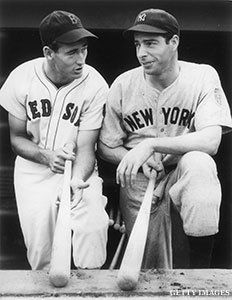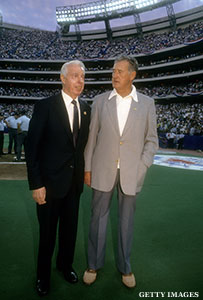
Ask even the most casual baseball fan to name the player who holds the record for longest hitting streak in Major League Baseball history, and odds are you'll hear the correct answer, Joe DiMaggio, and the correct number of games, 56. But ask a diehard baseball fan to name the player who holds the record for reaching base safely in the most consecutive games, and odds are you won’t hear the correct answer, Ted Williams, or the correct number of games, 84. Even in our post-Moneyball world, where batting average has been de-emphasized and on-base percentage has been elevated, DiMaggio's mark is discussed with awe and admiration, while Williams' streak goes largely unnoticed, tucked away like a torn ticket stub from childhood.
This weekend is the 70th anniversary of the end of DiMaggio's streak, which served as the catalyst for a new book, 56: Joe DiMaggio and the Last Magic Number in Sports, and any number of newspaper and magazine articles, including a cover story in Sports Illustrated. Often mentioned in these articles is that when DiMaggio's streak finally ended, he immediately started a 16-game hitting streak. What's often omitted, however, is that DiMaggio drew a walk in what would have been the 57th game. Moreover, he earned a walk in the game directly preceding the beginning of his hitting streak. Joe DiMaggio actually reached base safely in 74 straight games in 1941. Impressive, no?
Now tack on an extra 10 games and you come to understand how impressive Williams' streak was in 1949.
On one hand, it's easy to understand why a hitting streak is more captivating than a streak of safely reaching base via hit, walk or hit by pitch. If brevity is the soul of wit, it's also the soul of common knowledge, and getting a base hit in consecutive games comprises a more tangible, action-packed event than, say, reaching base via three possible routes. Did DiMaggio get a hit today? Yup, streak continued. Did Williams get a hit today? No, but he did draw two walks and was also intentionally walked in his last at-bat, so his streak con---zzzz.
That's not my reaction -- the snoozing. But that's obviously the reaction of most fans. In a sport that's often derided for its lack of action, a base hit (which happens about 25 percent of the time, at least during 2011, another down year for offense) is truly the exception. Can you imagine if the shooting percentage in the NBA was 25 percent? Every made bucket would be noteworthy. That's more or less how it is with baseball, where the action (the base hit) has always been championed, while the perceived slog (the walk) has been given second-tier status. If you look at the traditional scoreboard at any baseball park, be it Little League or Yankee Stadium, there's a running count of runs, hits and errors. But walks? No, they get no love. They're not sexy. They're relatively passive and somewhat blah. But it doesn't take an overly creative imagination (or Brad Pitt as Billy Beane) to see that a walk is as good as a single.

Joe DiMaggio never had more than 80 walks in a season. He twice led the league in home runs and slugging percentage, and had the remarkable feat of accumulating nearly as many career home runs, 361, as strikeouts, 369. But he never led the league in on-base percentage. In short, he was a contact hitter who liked to swing the bat. And unless he was preternaturally adept at hitting balls out of the strike zone, pitchers really didn't pitch around him.
The same cannot be said of Ted Williams.
The Splendid Splinter led the league in walks eight times. He has the fourth-most free passes (2021) in MLB history, and his career on-base percentage (.482) ranks first. He often said that he wanted to be known as the greatest hitter who ever lived, but perhaps more accurately he should have been called the greatest on-base machine who ever lived. But again, that goes back to the whole issue of brevity/easy digestibility.
If you look at the list of the longest hitting streaks in MLB history, you won’t find Ted Williams' name anywhere near the top. His longest streak was "just" 23 games, which came in 1941, when some other fella strung together a record that's supposedly the most unbreakable in sports. And yeah, you can argue that it's more difficult to get a base hit in 56 straight games than it is to reach base via hit, walk or hit by pitch in 84 straight. But considering the closest anyone has come to Williams' record since 1949 was Orlando Cabrera, who reached base in 63 straight games in 2006, maybe it's not.
Cabrera's streak garnered a modicum of media attention, but Andre Ethier's 30-game hit streak this year probably received more. Does the fact that Cabrera, a decent but hardly Hall of Fame-worthy player, can put together a streak to challenge Williams (if you can consider coming within 21 games a "challenge") somehow diminish this type of streak? If it does, then what does it say when hitters like Benito Santiago, Ken Landreaux and Jimmy Rollins all had hitting streaks that were more than 30 games?

Hitting streaks require some luck, and so do streaks like Williams' 84 straight games of reaching base safely. But one common factor among all the hitters atop the list of longest-consecutive hit streaks is that none of them drew a lot of walks. In fact, if you combine the 100-walk seasons of all the players who had hitting streaks of more than 34 games (18 players), you arrive at two: Dom DiMaggio in 1948 and Pete Rose in 1974. Hall of Famers like Paul Molitor, Ty Cobb, and George Sisler never passed the century mark. And neither have Chase Utley, Jimmy Rollins or Luis Castillo. These players were able to compile long hit streaks in part because (you guessed it) they liked to swing the bat. And it's that action, that pressing need to put bat to the ball and find a safe haven between fielders, which makes hitting streaks so captivating. We get it -- action is good; it's entertaining and easy on the eyes. At the same time, it’s kind of silly that a hitting streak like DiMaggio’s can be widely revered, while an on-base record like Williams’ goes widely unknown.
We're in the post-Moneyball era, and fans understand that on-base percentage is paramount to batting average. It's time Williams' record got its due.
Popular On ThePostGame:
-- Nolan Ryan-Robin Ventura: Inside Story Of Baseball's Most Famous Fight
-- Jim Gentile: The Story Of Baseball's Forgotten 1961 Sensation
-- Tom Glavine: I Could've Played With Wayne Gretzky




